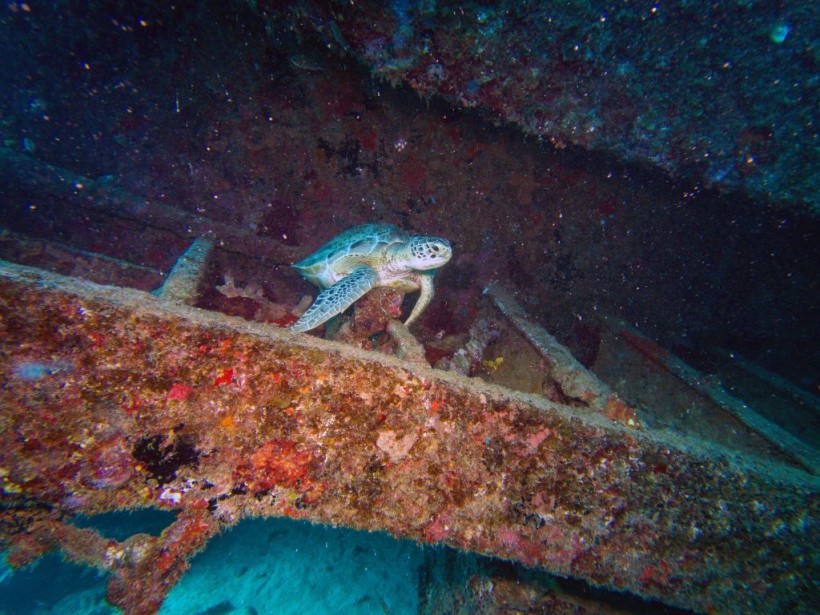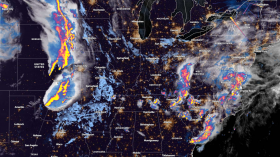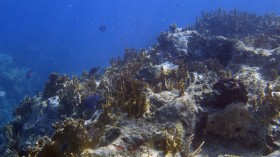The ocean is home to a vast and diverse array of life forms, from microscopic plankton to gigantic whales.
These marine organisms play a vital role in the Earth's climate system, as well as in providing food, livelihoods, and recreation for billions of people.
But the ocean is also facing unprecedented threats from human activities, especially from climate change.
A new study has revealed how global warming is affecting the distribution and adaptation of marine life, and what this means for the future of the ocean's biodiversity.
Warming waters drive marine life to migrate and adapt
 (Photo : JOSEPH PREZIOSO/AFP via Getty Images)
(Photo : JOSEPH PREZIOSO/AFP via Getty Images)

Climate change is having a direct and dramatic effect on marine environments across our planet.
As the world's oceans warm, the total mass of sea animals is projected to drop by 5% for every degree Celsius (1.8 degrees Fahrenheit) of temperature increase.
This means that by the end of the century if greenhouse gas emissions continue at the current rate, the oceans could lose one-sixth of their marine life.
However, not all species are equally affected by the rising temperatures. Some are more sensitive to thermal stress, while others are more resilient or adaptable.
A new study by an international team of marine biologists, published in eLife Science Journal, has identified seven parameters that may be useful as biomarkers for evaluating how fast and to what extent coral reef fishes can cope with increasing temperatures.
The researchers collected two common coral reef fishes from the northern Great Barrier Reef in Australia: the five-lined cardinalfish and the redbelly yellowtail fusilier.
They then exposed them to temperatures 3.0 degrees Celsius above the average summer temperatures for the area, simulating the conditions of an underwater heatwave.
They found that the fusilier rapidly responded to the thermal stress, with nearly immediate changes detected in gill shape structure, and blood parameters.
However, the cardinalfish exhibited a delayed response and was far less able to adjust to the elevated temperatures.
The study suggested that the fusilier may have a higher capacity to acclimate to warming waters, while the cardinalfish may be more vulnerable to the effects of climate change.
The researchers also pointed out that these underwater heatwaves can cause increases of up to 5 degrees C above seasonal average temperatures over just days and can last for several weeks, which could have long-term effects on the survival and reproduction of marine animals.
Also Read: Oyster Reef Habitats Begin to Disappear as Cold Temperatures Decrease in Florida Waters
The consequences of shifting distributions and changing ecosystems
The impact of climate change on marine life is not only measured by the loss of biomass but also by the changes in the distribution and composition of species.
There is strong evidence of warming leading to poleward shifts in the ranges of many marine animals, as they seek cooler habitats that match their thermal preferences.
This can result in the expansion of some species into new areas, but also the contraction or disappearance of others from their historical regions.
These shifts can have profound consequences for the structure and function of marine ecosystems, as well as for the human societies that depend on them.
For example, some fish stocks may move away from their traditional fishing grounds, affecting the livelihoods and food security of coastal communities.
Some invasive species may colonize new habitats, outcompeting or preying on native species and altering the balance of the ecosystem.
Meanwhile, some coral reefs may lose their diversity and resilience, as the warm-water corals that build them are replaced by other organisms or die from bleaching events.
The researchers warned that the current rate of climate change is too fast for many marine species to adapt or migrate and that urgent actions are needed to reduce greenhouse gas emissions and protect the ocean's biodiversity.
They also called for more studies to understand the physiological and ecological responses of marine animals to warming waters, and to identify the most vulnerable and resilient species.
By doing so, they hoped to provide better predictions and guidance for the conservation and management of the ocean's resources.
Related article: Climate Change Helping Tropical Fish to Destroy Kelp Forests of Japan, Australia
© 2024 NatureWorldNews.com All rights reserved. Do not reproduce without permission.





